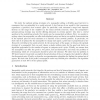Free Online Productivity Tools
i2Speak
i2Symbol
i2OCR
iTex2Img
iWeb2Print
iWeb2Shot
i2Type
iPdf2Split
iPdf2Merge
i2Bopomofo
i2Arabic
i2Style
i2Image
i2PDF
iLatex2Rtf
Sci2ools
103
click to vote
WINE
2010
Springer
2010
Springer
Optimal Pricing in the Presence of Local Network Effects
We study the optimal pricing strategies of a monopolist selling a divisible good (service) to consumers that are embedded in a social network. A key feature of our model is that consumers experience a (positive) local network effect. In particular, each consumer's usage level depends directly on the usage of her neighbors in the social network structure. Thus, the monopolist's optimal pricing strategy may involve offering discounts to certain agents3, who have a central position in the underlying network. Our results can be summarized as follows. First, we consider a setting where the monopolist can offer individualized prices and derive an explicit characterization of the optimal price for each consumer as a function of her network position. In particular, we show that it is optimal for the monopolist to charge each agent a price that is proportional to her Bonacich centrality in the social network. In the second part of the paper, we discuss the optimal strategy of a monop...
Economy | Monopolist | Optimal Pricing | Social Network | WINE 2010 |
Related Content
| Added | 15 Feb 2011 |
| Updated | 15 Feb 2011 |
| Type | Journal |
| Year | 2010 |
| Where | WINE |
| Authors | Ozan Candogan, Kostas Bimpikis, Asuman E. Ozdaglar |
Comments (0)

